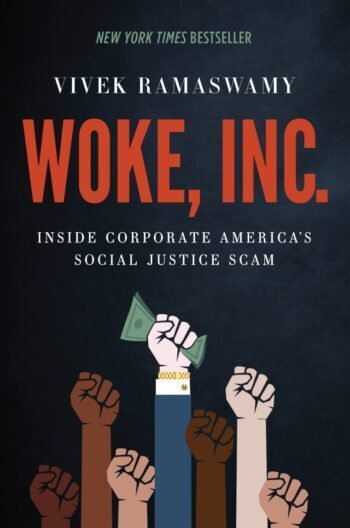Woke Inc: An Eye-Opening Critique by Vivek Ramaswamy
Are you familiar with the term “woke”? It’s a word that has gained popularity in recent years, often used to describe a heightened awareness of social and political issues. But have you ever considered the impact of “woke culture” on our society as a whole? In his book “Woke Inc,” author Vivek Ramaswamy takes a critical look at this phenomenon and its effects on everything from politics to business. Join us as we delve into Ramaswamy’s eye-opening critique and explore the implications of this cultural shift.

Introduction: A Brief Overview of Woke Inc by Vivek Ramaswamy
Woke Inc by Vivek Ramaswamy is a thought-provoking book that critiques the current state of woke culture. Ramaswamy, a successful entrepreneur and investor, argues that the social justice movement has been co-opted by corporations and the elite to further their own interests. He believes that this has led to a stifling of free speech and a narrowing of intellectual diversity.
The book provides a comprehensive analysis of the origins and evolution of woke culture, as well as its impact on society and business. Through personal anecdotes and data-driven insights, Ramaswamy challenges readers to question their own beliefs and assumptions about social justice movements. Overall, Woke Inc is an important contribution to the ongoing debate about the role of activism in modern society.
Understanding the Critique: Ramaswamy’s Perspective on Woke Culture
Understanding the Critique: In Woke Inc, Vivek Ramaswamy offers a scathing critique of what he calls the “woke industrial complex.” He argues that this movement, which began as a way to promote social justice and equality, has been co-opted by corporations and elites for their own gain. Ramaswamy contends that this has led to a culture of censorship and intolerance, where dissenting voices are silenced and free speech is under threat.
He also takes aim at the hypocrisy of many woke activists, who claim to champion diversity and inclusion but often engage in exclusionary practices themselves. Overall, Ramaswamy’s perspective is a provocative one that challenges many of the assumptions underlying contemporary social justice movements.
Analyzing the Arguments: Key Points and Examples from the Book
Ramaswamy’s critique of woke culture is rooted in his belief that it has created a new form of authoritarianism. He argues the woke movement has become too powerful and is now imposing its beliefs on others, much like the religious zealots of the past did.
Ramaswamy also suggests that cancel culture is a result of this movement and it suppresses dissenting opinions. He provides examples from both politics and business to illustrate how those who do not conform to these new values are punished or shunned by society at large. Ramaswamy believes that individuals must be allowed to express their own thoughts without fear of retribution, especially within professional settings where diversity of thought should be encouraged rather than stifled for the sake of conformity.
The Impact of Woke Inc: Ramaswamy’s Insights on Society and Business
The Role of Woke Inc in Shaping Corporate Culture
Woke Inc has had a significant impact on corporate culture, with many companies adopting woke ideologies to appeal to younger consumers and maintain a positive public image. Ramaswamy argues that this trend has led to a dangerous shift away from meritocracy and towards identity politics, where diversity and inclusion are prioritized over qualifications and performance.
This has resulted in a decrease in productivity and innovation, as well as a lack of intellectual diversity within organizations. Additionally, Ramaswamy highlights the potential legal risks associated with implementing woke policies, such as discrimination lawsuits.
How Woke Ideology is Affecting Societal Narratives
The rise of woke culture has had a significant impact on societal narratives, with Ramaswamy arguing that it has led to a narrow and divisive view of the world. The focus on identity politics and group identities has created a fragmented society where individuals are defined by their race, gender, or sexual orientation rather than their unique experiences and perspectives.
This has resulted in a culture of victimhood and intolerance towards dissenting opinions, stifling open dialogue and debate. Furthermore, woke ideology has infiltrated various institutions such as education and media, leading to a biased portrayal of reality that reinforces certain narratives while ignoring others.
The Political Influence of Woke Inc on Businesses Today
The political influence of Woke Inc on businesses today is a key theme in Vivek Ramaswamy’s book. He argues that the rise of woke culture has led to increasing pressure on companies to align with progressive values and become politically active. Ramaswamy cites examples such as Nike’s controversial decision to support Colin Kaepernick, which ultimately boosted its sales but also sparked a backlash from some consumers.
He suggests that this trend toward politicization puts businesses in a difficult position, forcing them to navigate complex social issues while still maintaining profitability. Ultimately, Ramaswamy contends that this intersection between politics and business may have significant consequences for both society and the economy.
Navigating the Risks and Benefits of Being a “Woke” Company
Woke Inc by Vivek Ramaswamy sheds light on the growing trend of companies embracing woke culture. While this may seem like a positive step towards inclusivity, there are risks that come with it. On one hand, companies can gain loyal customers and improve their reputation by publicly supporting causes related to social justice. On the other hand, they risk facing backlash from those who disagree with these values or view it as insincere marketing tactics. It’s crucial for businesses to navigate these risks and benefits carefully if they wish to successfully align themselves with woke culture.
Is Woke Culture Here to Stay? Examining the Future of Social Justice Movements
Amidst the ongoing controversies and debates about woke culture, Ramaswamy delves into the question of whether or not it is here to stay. He acknowledges that there are deep-seated issues of injustice in our society that need to be addressed. However, he argues that progressive movements have become increasingly radicalized and intolerant towards opposing viewpoints, leading to a toxic cancel culture.
Ramaswamy also expresses concern over the impact of woke ideology on businesses and markets. Companies are under increasing pressure to conform to certain political agendas and risk losing customers or facing backlash if they do not comply. This may lead to a stifling of innovation and creativity as well as an erosion of free speech.
Despite these challenges, Ramaswamy remains hopeful for a more balanced approach toward social justice movements. He advocates for greater transparency in discourse, where people feel safe expressing their opinions without fear of being silenced or ostracized (important key phrase). He suggests that exposing people from different backgrounds with diverse perspectives working together toward common goals could create meaningful progress (important key phrase) rather than widening divides between groups through divisive labels such as ‘woke’ and ‘anti-woke.’
Conclusion: Final Thoughts on Woke Inc and Its Relevance Today
The ideas presented in Woke Inc by Vivek Ramaswamy are thought-provoking and timely. As society continues to grapple with issues of race, gender, and social justice, the book offers a critical perspective on the impact of woke culture on our businesses and institutions. Ramaswamy’s arguments against corporate activism raise important questions about the role of corporations in shaping public discourse.
In conclusion, Vivek Ramaswamy’s book “Woke Inc” offers a thought-provoking critique of the current state of woke culture. Through his insightful analysis and examples, Ramaswamy sheds light on the impact of this phenomenon on society and business. While some may argue that woke culture is here to stay, Ramaswamy’s book challenges readers to consider the potential consequences of blindly following this trend. Ultimately, “Woke Inc” serves as an important reminder to question the status quo and think critically about the world around us.

